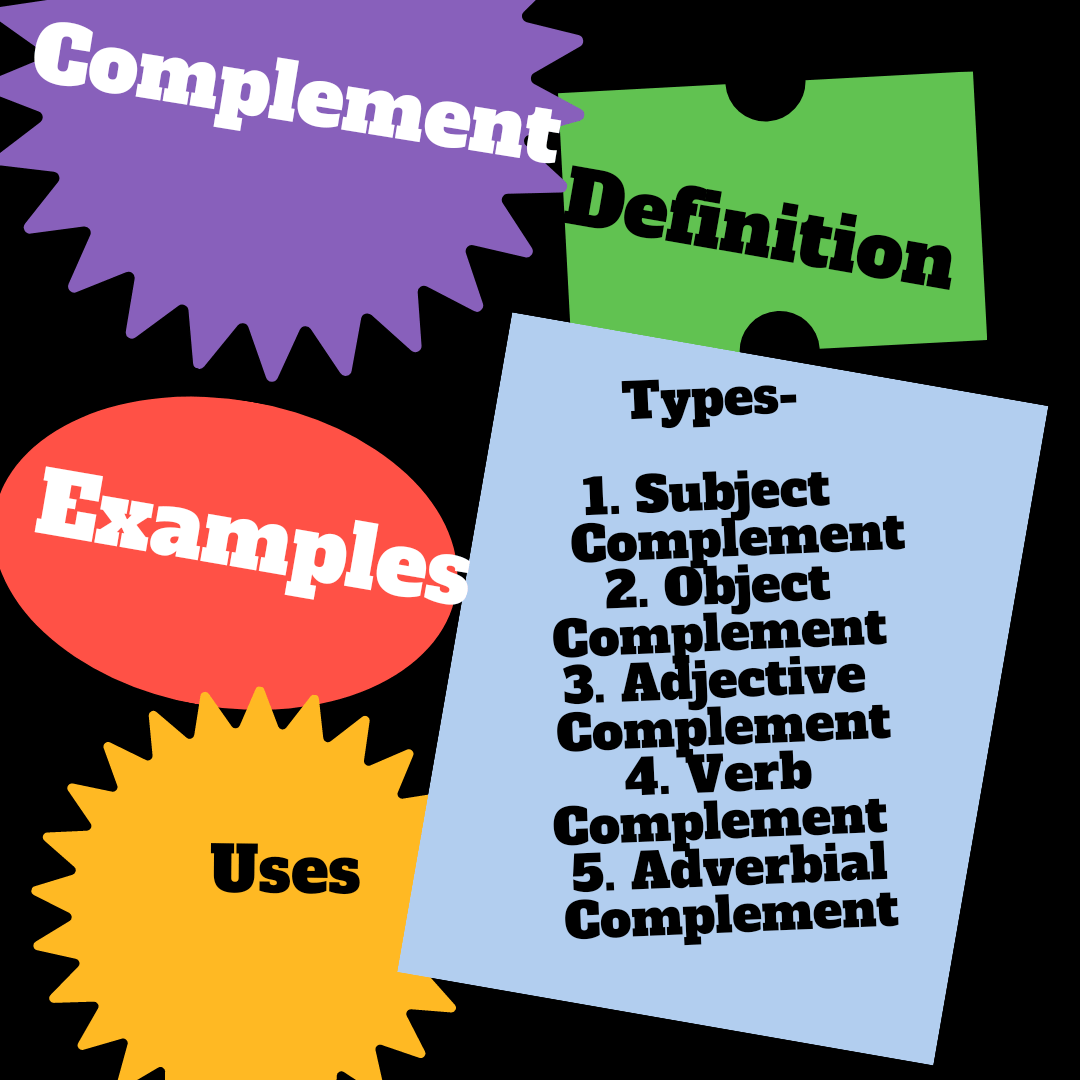What is Complement in English?
In English grammar, a complement is a word or group of words that is used to complete the meaning of a part of the sentence . It is important to express the specific meaning the sentence intends to express.
Types of Complements –
1 . Subject Complement – It is a word or a phrase or a clause that comes after a linking verb to modify or rename the subject .
It is called Predicate Nominative when it renames the subject and it is called Predicate Adjective when it modifies the subject .
Examples –
i . Predicate Nominative –
Rohit is my friend .
Here my friend is a Subject Complement and renaming the subject. It is a noun phrase .
ii . Predicate Adjective –
Rohit is brilliant in his study .
Here brilliant is an adjective and it is modifying the subject .
2 . Object Complement – It is a word or phrase that sits after a direct object in a sentence and identifies it , either renames it or modifies it .
It is a noun that renames the object and an adjective that modifies the object .
Examples –
i . Noun as an object complement -Team Management has announced him the team captain.
Here , the team captain is a noun phrase and is acting as a complement to the object – him .
ii . Adjective as an object complement –
He made the task simple .
Here , simple is an adjective and it is modifying the object – the task .
3 . Adjective Complement – It is a phrase or clause used to complete the meaning of an adjective by providing more information about it . It is a phrase or clause and sits next to an adjective.
There are three types of Adjective Complements–
i . Prepositional Phrase as an Adjective Complement
ii . Noun Clause as an Adjective Complement
iii . Infinitive Phrase as an Adjective Complementi .
i . Prepositional Phrase as an Adjective Complement – It comes next to an adjective in the sentence to give more information about the adjective. It is formed by a preposition and its object.
Example – Your father is concerned about your career.
He is devoted to his job .
Here in the above sentences, about your career and to his job are Prepositional Phrases and are giving more information about the respective adjectives, concerned and devoted.
ii . Noun Clause as an Adjective Complement – It is a dependent noun clause that gives more information about the adjective in the sentence and often starts with Subordinating Conjunctions, like – what, who, whom, where, why, when, how, that .
Examples –
The coach is delighted when all his students have completed the task.
It is important that he is trying .
iii . Infinitive Phrase as Adjective Complement – It is an infinitive phrase that gives motore information about the adjective in the sentence.
Examples –
I am glad to meet you again .
Rahul was clever to avoid the mistake.
Here in the above sentences, to meet with you again and to avoid the mistake – these are infinitive phrases giving more information about the respective adjectives, glad and clever.
4 . Verb Complement – It is a word or phrase or clause that comes after a verb as an object and completes the meaning of the verb .
Different types of Verb Complements –
i. Noun or Noun Phrase as Verb Complement –
Examples –
I don’t have time to waste .
The teacher is teaching students to write effortlessly.
I used the method .
In the above three sentences , time ,students and the method – these are acting as objects and verb complements .
ii . Noun Clause as Verb Complement – It is a dependent noun clause that is used as the object of the verb in the sentence .
Example – He understood what you want .
Manager advised where to go .
I know that it is not your fault.
In these above sentences , what you want, where to go, that it is not your fault – these are acting as objects of the verb .
iii. Pronoun as Verb Complement –
Examples –
They have helped me enormously.
You can call us .
Here in these sentences , me and us are pronouns and used as objects of verbs .
iv. Gerund or Gerund Phrase as Verb Complement –
Examples – He likes reading .
My parents love traveling with us .
Here in above sentences, reading and traveling with us – these are used as Gerund and Gerund Phrase to receive the main verb directly .
v. Infinitive or Infinitive Phrase as Verb Complement –
Examples – I tried to play .
He wants to visit the place .
In these sentences, to play and to visit the place – these are used as Infinitive or Infinitive Phrase to complement the verbs .
5 . Adverbial Complement – It is an adverb or adverbial phrase that is used to complete the meaning of a verb in a sentence. It helps to complete the meaning of a verb so it is also a verb complement .
Examples – I want to go there .
You are fighting unnecessarily.
Susan works with great skill.
Here in these sentences, there , unnecessarily and with great skill – these are used as Adverbial Complement.
Preposition as Adverbial Complement in Phrasal Verb –
Phrasal Verbs are formed with an action verb and a preposition . Like – go through, break through, going after, catch on , etc.
When we use Phrasal Verbs in sentences these prepositions act as Adverbial Complements.
Examples – You need to go through the book.
They were going after the thief .
Here in these sentences, through and after are prepositions, used as Adverbial Complements.



